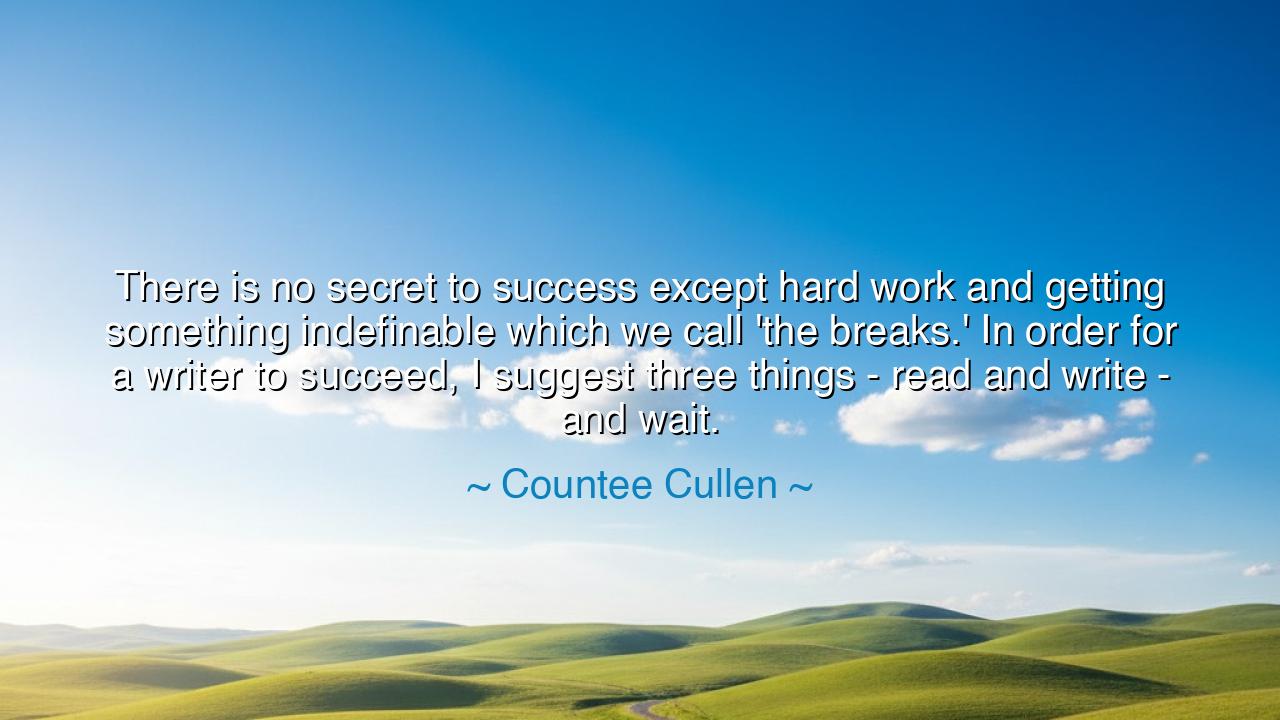
There is no secret to success except hard work and getting
There is no secret to success except hard work and getting something indefinable which we call 'the breaks.' In order for a writer to succeed, I suggest three things - read and write - and wait.






The poet Countee Cullen, voice of the Harlem Renaissance, once declared: “There is no secret to success except hard work and getting something indefinable which we call ‘the breaks.’ In order for a writer to succeed, I suggest three things—read and write—and wait.” These words carry the rhythm of life’s eternal law: that the fruits of labor do not come from chance alone, nor from effort alone, but from the marriage of both—the sweat of the brow and the mysterious favor of fortune. In his wisdom, Cullen unmasks the illusion of hidden formulas, reminding us that success has no secret door, only the long road of hard work walked with patience.
In this saying, there is first the law of labor. Without toil, without the daily discipline of practice, no craft can grow strong. The writer who refuses to read is like a warrior who never studies the sword. The one who refuses to write daily is like a farmer who plants no seeds. Cullen speaks as a master who knew the cost of art: the endless hours bent over books, the ceaseless shaping of words. His first command is clear—immerse yourself in the river of words, both those written by others and those you create with your own hands. This is the foundation.
Yet Cullen also acknowledges a truth humbler and greater still: that after all one’s hard work, there is the unpredictable force of what he calls “the breaks.” Fortune, timing, the alignment of events beyond human control—these, too, shape the destiny of a writer, or of any laborer. How many have worked diligently, yet never been discovered? How many others, less disciplined, were lifted suddenly by opportunity? To deny this mystery is to deny the way of the world. The ancients would call it fate, providence, or the will of the gods. Cullen, in his humility, names it simply: “the breaks.”
History offers many witnesses to this truth. Consider the tale of Herman Melville. In his lifetime, his great work Moby-Dick was neglected, dismissed by critics, and nearly forgotten. He labored, he wrote, he read—but the “breaks” did not favor him. Only decades after his death did the world awaken to the majesty of his prose. His story teaches us that waiting is as essential as writing itself. Time, though cruel in its silence, may yet unveil what was once ignored. Success does not always arrive in the hour we desire, but it may come in the hour appointed.
At the same time, think of Langston Hughes, Cullen’s contemporary, whose poems found recognition while he still lived. Hughes worked tirelessly, reading widely, writing endlessly, but he also found the “breaks”—mentors, publishers, and audiences willing to listen. His rise was not born of luck alone, but of preparation meeting opportunity. Thus Cullen’s wisdom rings true: one must do the work so that when the breaks arrive, one is ready to seize them. Without readiness, opportunity is wasted; without opportunity, readiness lies dormant.
What, then, is the lesson for us who hear these words centuries later? It is this: embrace the path of discipline. Do not waste hours in dreaming of shortcuts or secrets, for there are none. Commit yourself to the work—whether in writing, art, business, or life. Read widely, that your mind may be sharpened. Write—or create—incessantly, that your skill may grow. And then, wait. Wait not in idleness, but in patience. Trust that time and chance will, in their season, bring forth openings you cannot force.
Practically, this means setting aside daily time for your craft, no matter how small. It means studying the masters before you, so their wisdom may inform your own. It means finishing your work, even when the world is silent in response. And it means cultivating patience, not as weakness, but as strength—the patience that allows roots to grow deep before the tree breaks the earth.
Thus, let Cullen’s words echo in your heart: hard work, the breaks, and the triad of read, write, and wait. There is no secret path, only the steady way. Walk it faithfully, and in time, when labor and fortune meet, your voice will rise, enduring beyond your days. For the one who works and waits is never truly forgotten.






AAdministratorAdministrator
Welcome, honored guests. Please leave a comment, we will respond soon